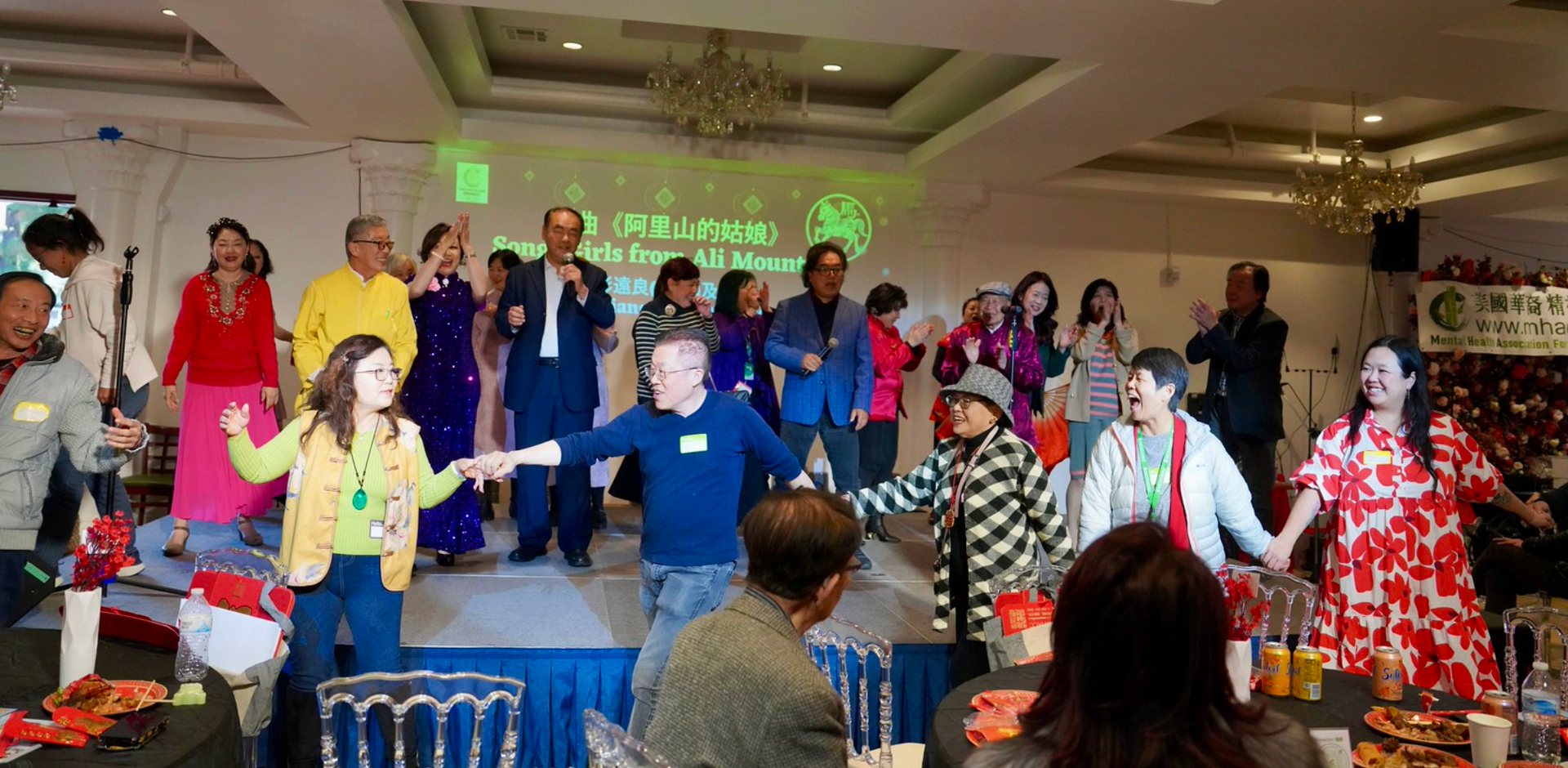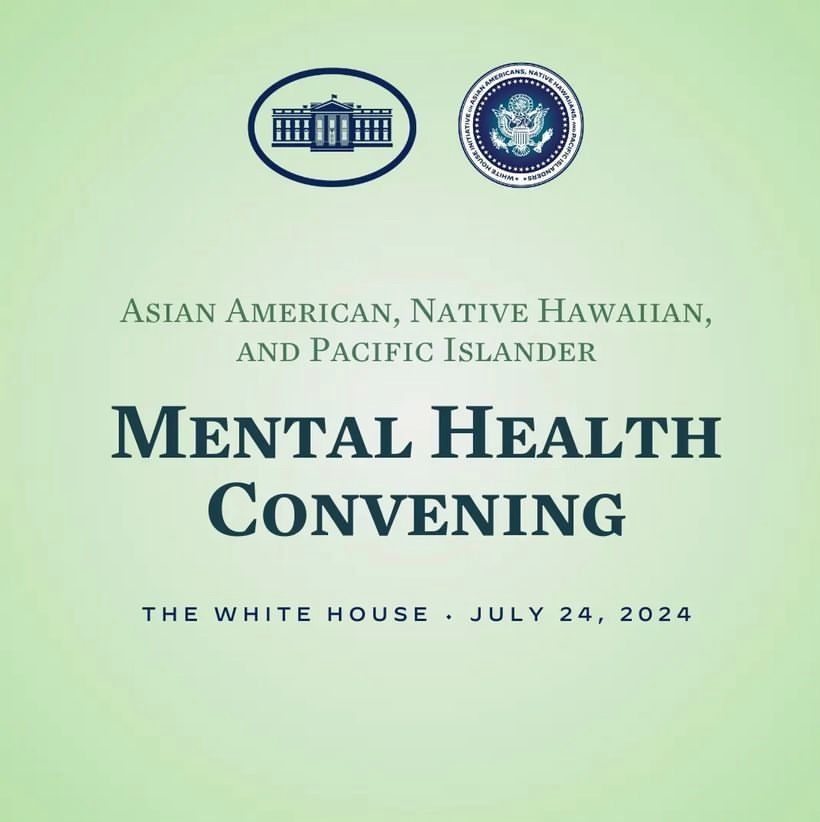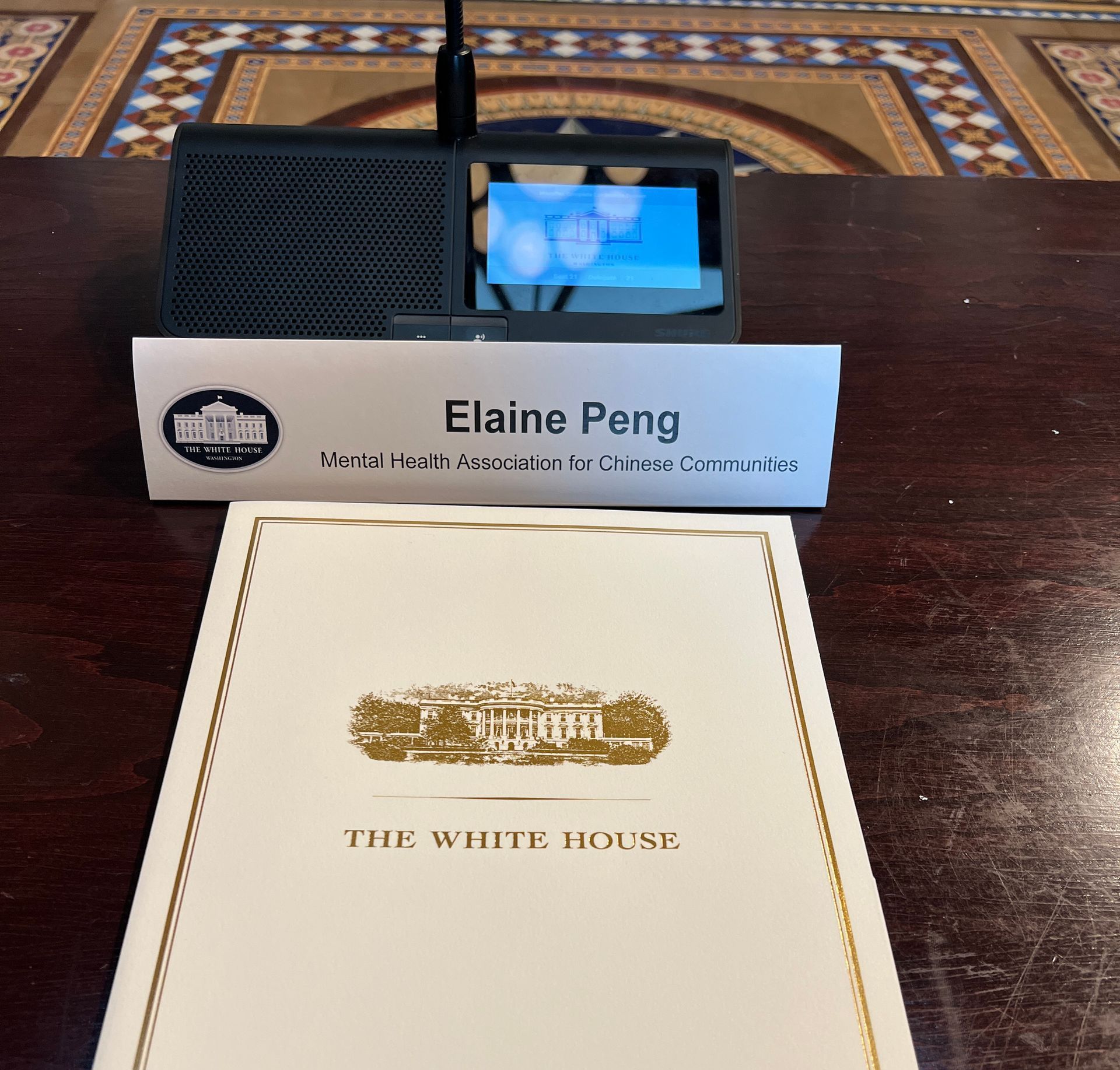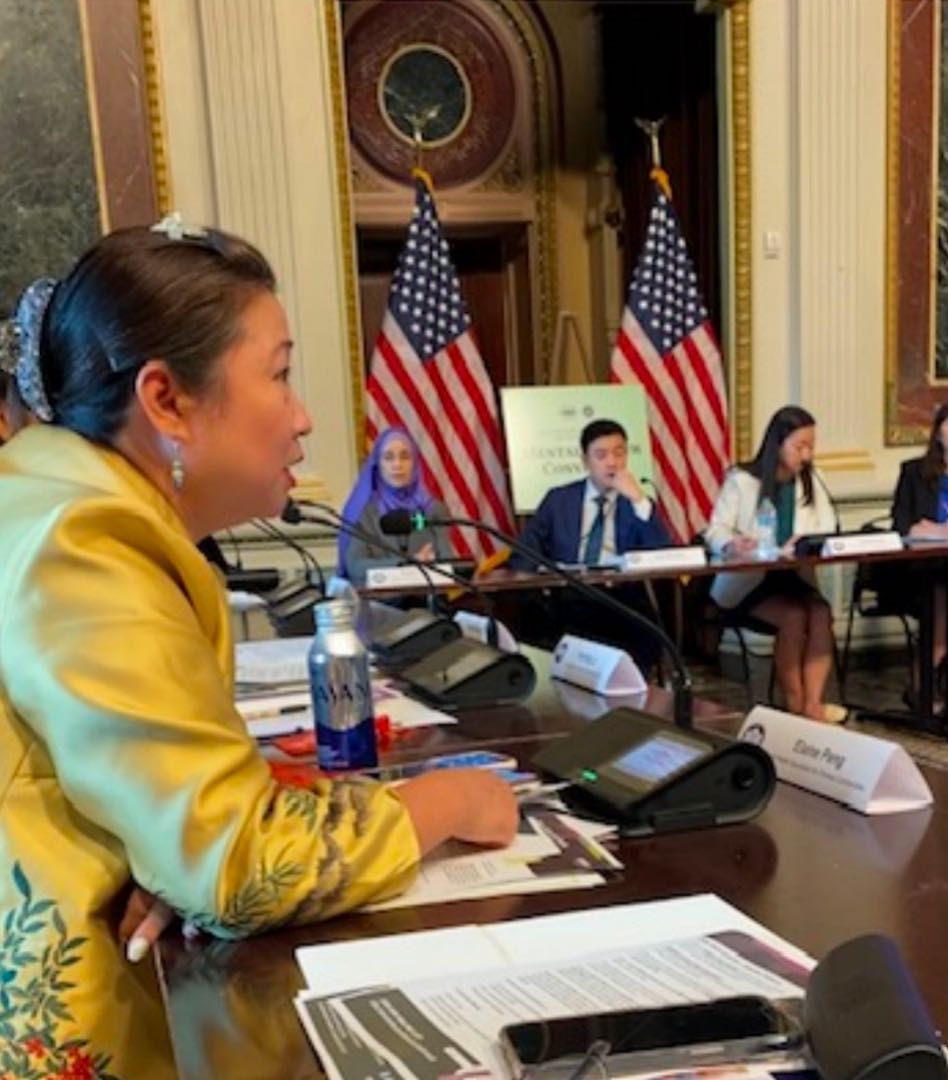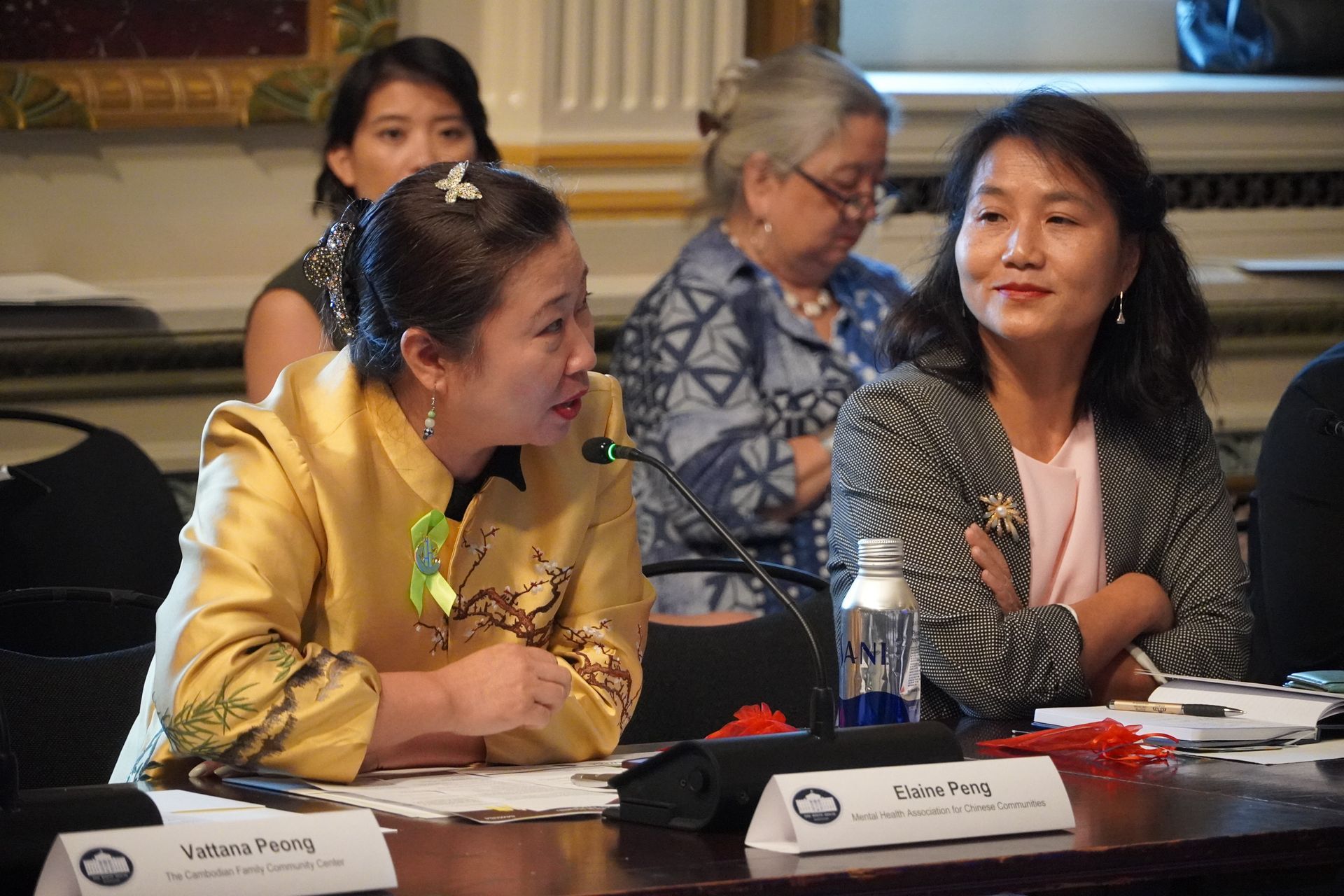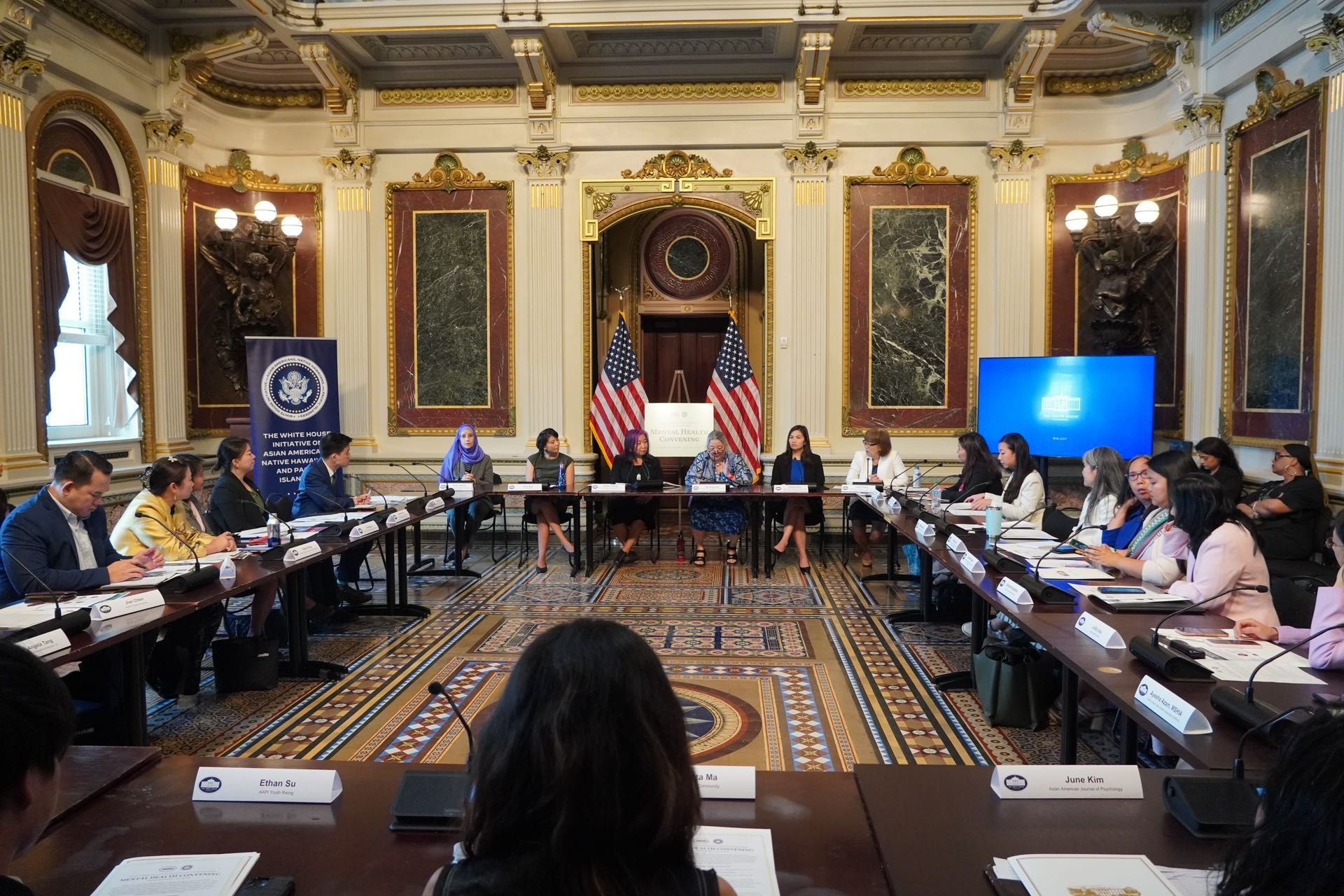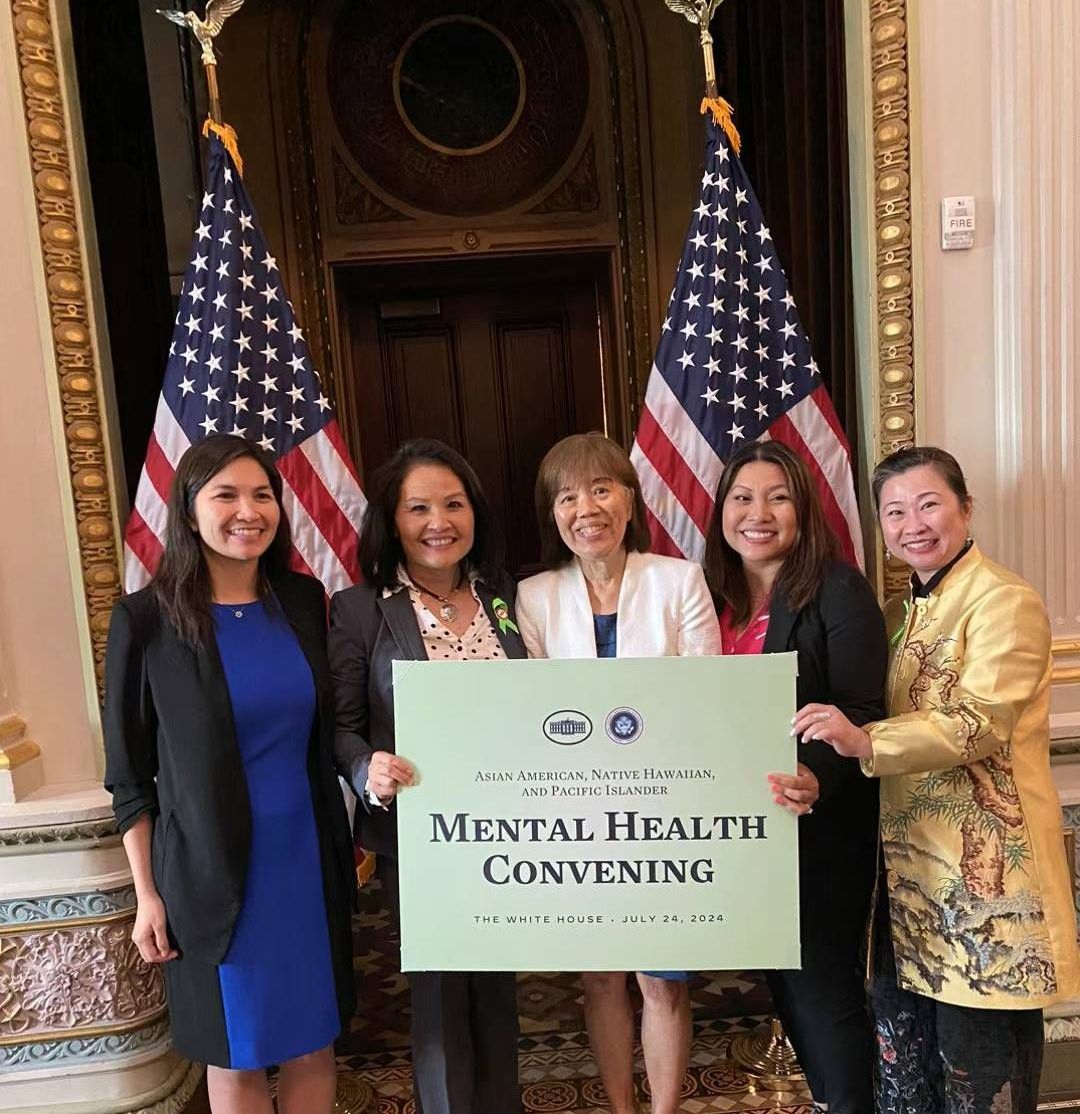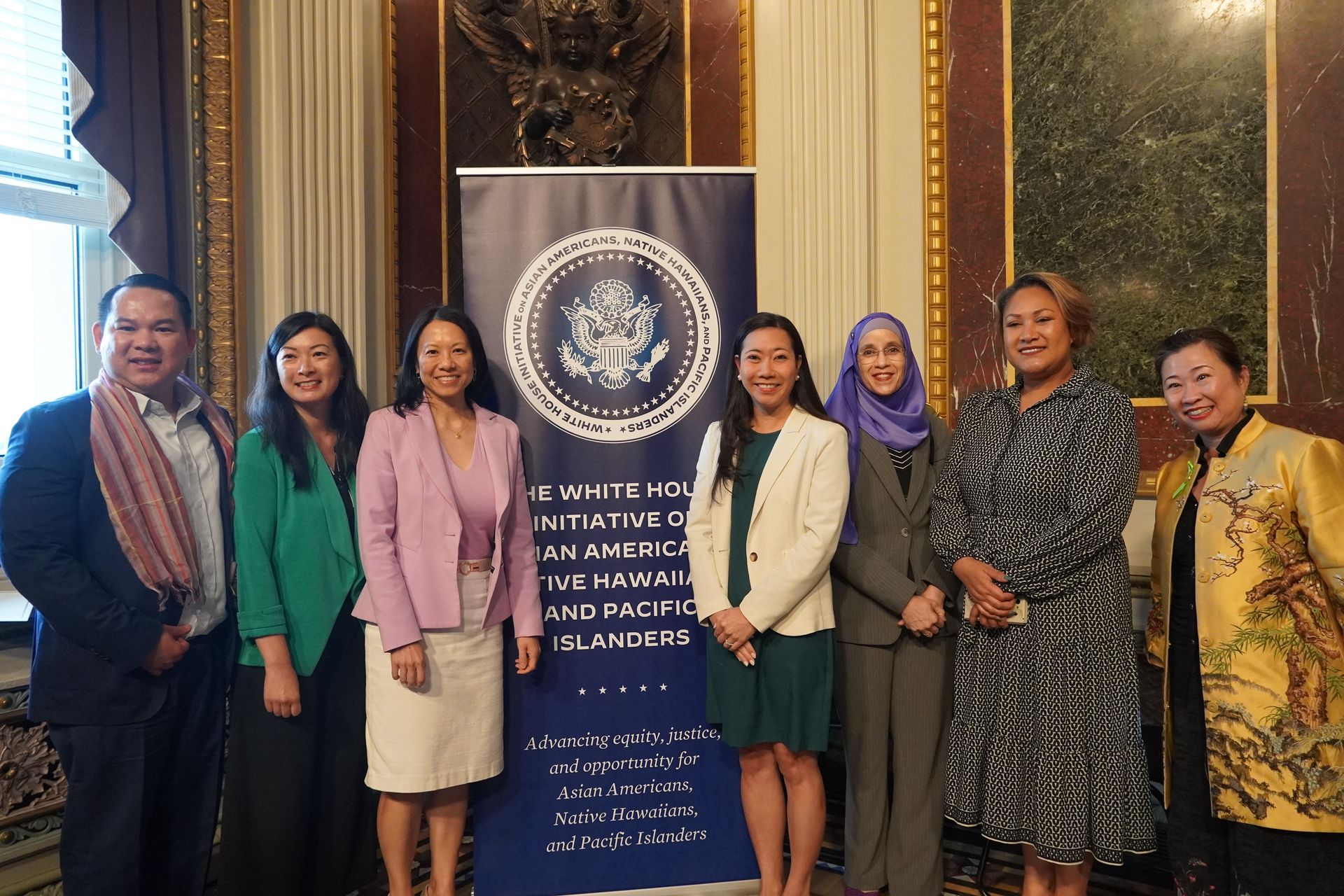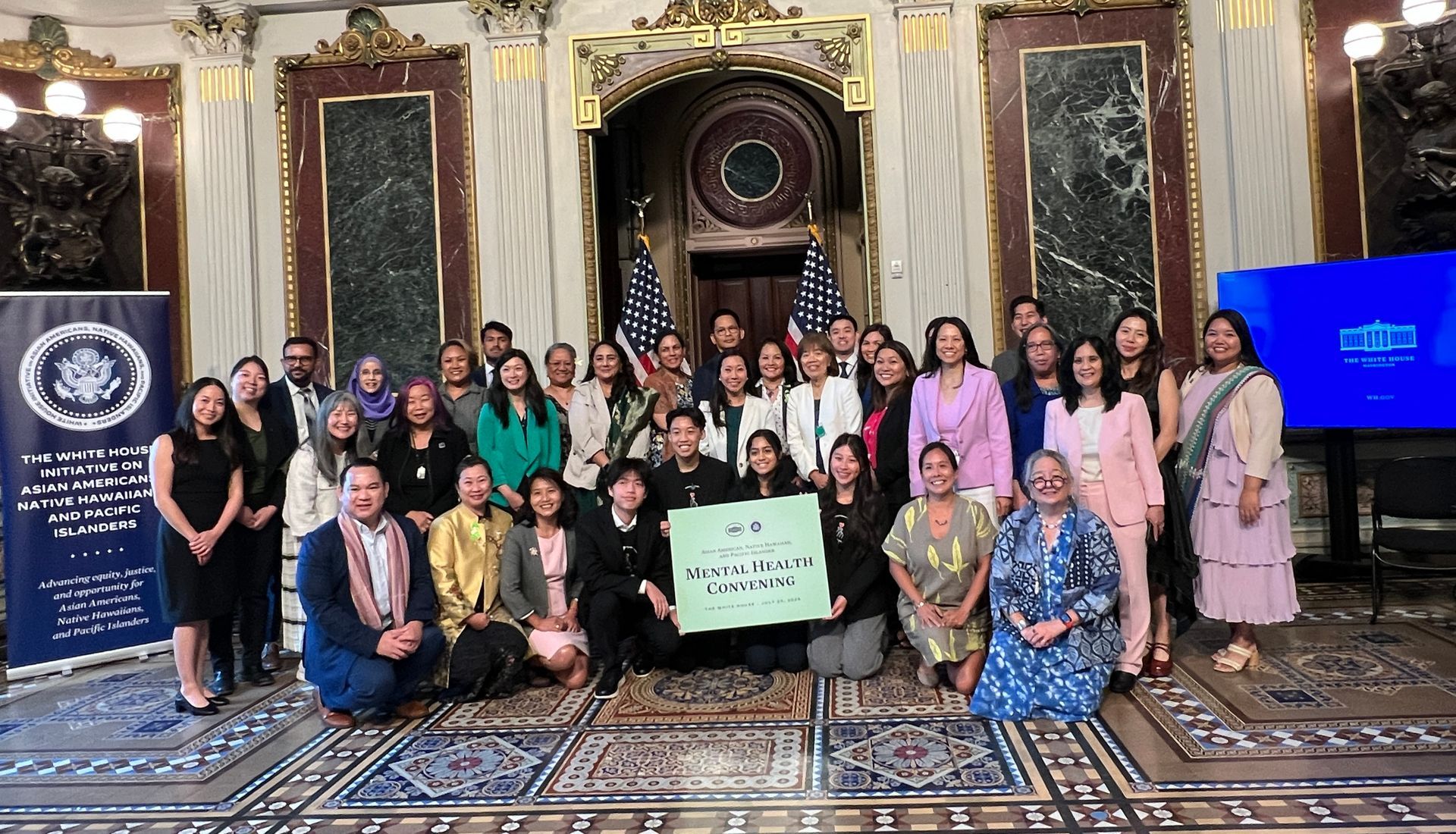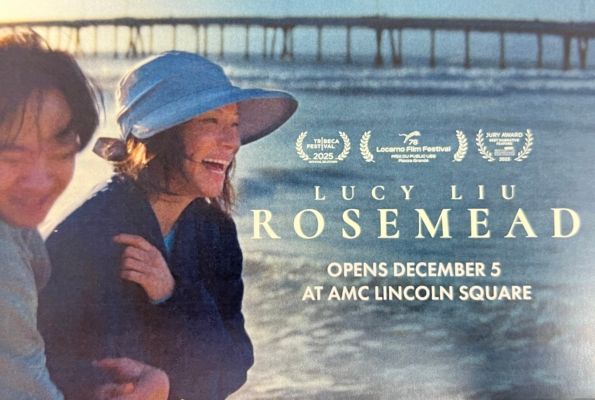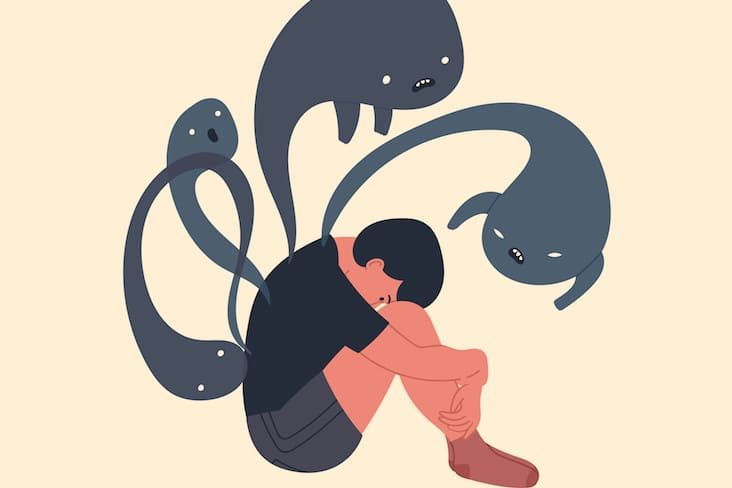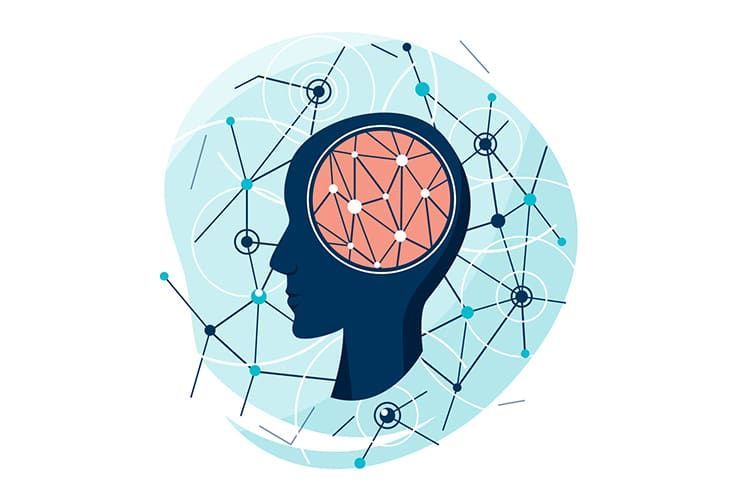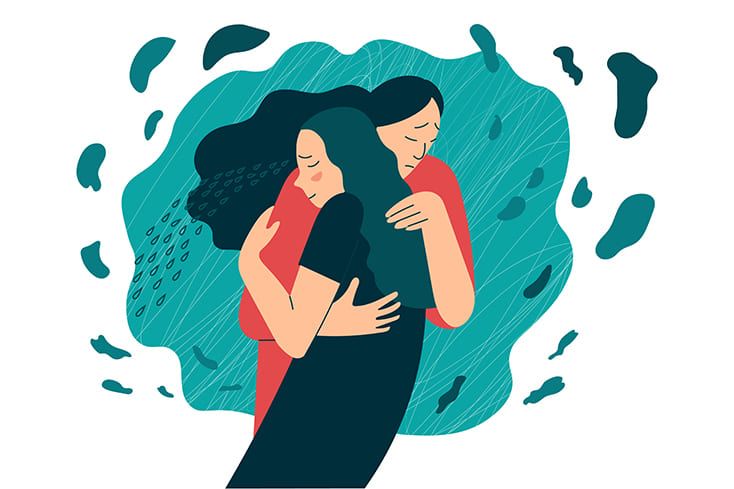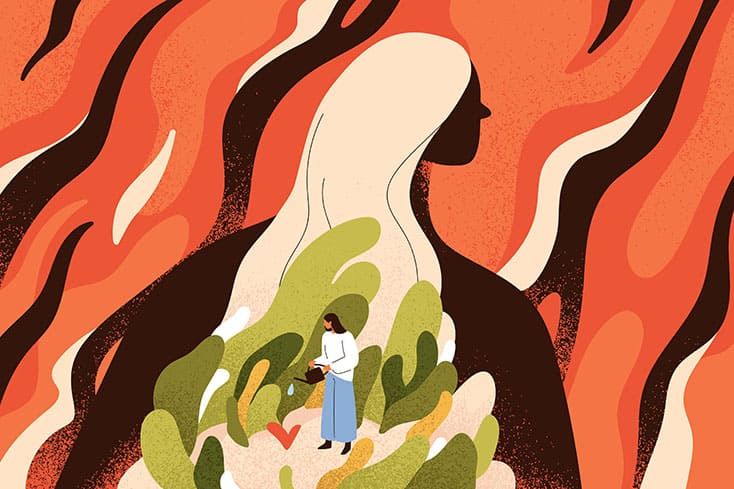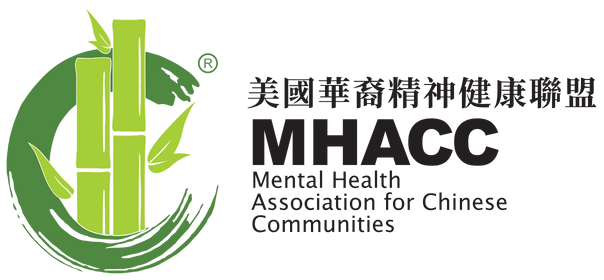彭一玲在白宮亞太裔精神健康會議為社區發聲 | Elaine Peng Advocates at White House AANHPI Convening
MHACC 雙語部落格快訊 |Bilingual Blog Flash News
Scroll down for an English version
7月24日,正值全美少數族裔精神健康月,美國華裔精神健康聯盟(MHACC)的執行長彭一玲和UCA WAVES(浪潮)的執行長Lily Chen(陳健)應邀出席白宮舉辦的亞太裔(AANHPI)精神健康會議,為華裔社區發出了強而有力的呼聲。這場具有里程碑意義的會議匯聚了聯邦高級官員、社區領袖和精神健康專業人士,共同探討亞太裔社區面臨的精神健康挑戰。
出席會議的重要人士包括白宮總統副助理兼AANHPI高級聯絡員莫里茲古(Erika Moritsugu)、美國衛生與公眾服務部助理部長萊文(Admiral Rachel L. Levine,MD)、美國藥物濫用與精神健康服務管理局(SAMHSA)行為健康公平辦公室主任Larke Huang、白宮亞太裔促進項目(WHIAANHPI)執行長Krystal Ka'ai,以及白宮公共參與辦公室高級顧問Kota Mizutani。此外,全美從事亞太裔精神健康研究和治療的專業人士,以及社區組織領袖和青少年組織領袖共數十人也出席會議並分享了各領域的寶貴經驗。
彭一玲在會上揭示了一個令人震驚的事實:儘管MHACC的暖線服務已運營十年,但僅獲得了3000美元的政府撥款。她說:「我們的暖線目前每週七天,從早上9時到晚上9時,30名受過培訓的員工和志願者,不間斷的提供國語、粵語、英語三種語言的免費情感支持、危機干預和資源轉介。然而,我們主要依靠四處籌集資金和私人捐贈來維持運營。」
彭一玲同時強調了語言在精神健康護理中的關鍵作用,指出缺乏文化和語言適當的服務使得社區成員,尤其是新移民,無法獲得足夠的支持。
她以半月灣槍擊案為例:「造成慘案的兇手趙春力患有嚴重的精神疾病。但由於不懂英語,他不知道如何正確服藥。這凸顯了我們社區亟需針對精神健康疾病進行預防和早期干預。」
與會者還討論了AANHPI社區中的精神健康污名問題,以及資源有限和缺乏文化敏感的醫療提供者等挑戰。會議強調了準確數據對指導政策和實踐的重要性,特別是考慮到AANHPI社區內部的多樣性。
UCA WAVES 的執行長陳健的發言別出心裁,在分別用國語、粵語和英文向與會者致意後,她強調了家長在幫助青少年獲取心理健康資源中的關鍵作用,並倡導"Nothing About Us Without Us"(我們社區的事務,必須有我們的參與)的原則。陳健指出,解決青少年心理健康危機需要全社會的努力,同時強調深入聽取社區聲音對尋找解決方案至關重要。她分享了UCA WAVES最近進行的青少年焦點小組研究,呼籲投資社區組織的研究能力,因為他們最了解社區問題和可能的解決方案。陳健還介紹了他們的心理健康急救培訓項目,指出了服務中存在的污名化問題,並強調需要社區組織與研究人員合作,以提高研究能力和服務效果。
會議最後強烈呼籲將資金用於提供文化特定預防和治療計劃的社區組織,以確保資源能到達最需要的個人和家庭。
這次會議不僅是一次深入的交流,更是一個新的起點。MHACC將繼續為華裔社區爭取更多的精神健康服務資源,推動建立一個更具包容性和支持性的精神健康護理體系,為每一位社區成員的精神健康保駕護航。
參考世界日報報導:暖線10年只獲3000元 華裔精神健康聯盟盼官方伸援
On July 24, During 'Bebe Moore Campbell Minority Mental Health Awareness Month', Elaine Peng, Executive Director of the Mental Health Association for Chinese Communities (MHACC), and Lily Chen, Executive Director of UCA WAVEs, attended the White House AANHPI Mental Health Convening, giving a powerful voice to the Chinese-American community. This landmark meeting brought together federal officials, community leaders, and mental health professionals to address mental health challenges facing the Asian American, Native Hawaiian, and Pacific Islander (AANHPI) communities.
Notable attendees included Erika Moritsugu, White House Deputy Assistant to the President and AANHPI Senior Liaison; Admiral Rachel L. Levine, MD, Assistant Secretary for Health at the U.S. Department of Health and Human Services; Larke Huang, Director of the Office of Behavioral Health Equity at SAMHSA; Krystal Ka'ai, Executive Director of the White House Initiative on AANHPIs; and Kota Mizutani, Senior Advisor at the White House Office of Public Engagement. Dozens of AAPI mental health researchers, practitioners, community organization leaders, and youth representatives also participated, sharing insights from various fields.
Peng revealed a shocking fact: despite a decade of operating MHACC's warmline service, they had received only $3,000 in government funding. "Our warmline operates seven days a week, from 9 AM to 9 PM, with 30 trained staff and volunteers providing free emotional support, crisis intervention, and resource referrals in Mandarin, Cantonese, and English. However, we mainly rely on fundraising and private donations to maintain our operations," Peng stated. She emphasized the crucial role of language in mental health care, noting how the lack of culturally and linguistically appropriate services leaves community members, especially new immigrants, without adequate support.
Illustrating the impact of language barriers, Peng cited the Half Moon Bay shooting: "The perpetrator, Chunli Zhao, suffered from severe mental illness. But due to his limited English, he didn't know how to take his medication properly. This underscores the urgent need for mental health prevention and early intervention in our community."
Participants also discussed mental health stigma in AAPI communities, limited resources, and the lack of culturally sensitive healthcare providers. The meeting highlighted the importance of accurate data to guide policies and practices, considering the diversity within AANHPI communities.
The speech by Lily Chen (UCA WAVES), was particularly distinctive. After greeting the attendees in Mandarin, Cantonese, and English, she emphasized the crucial role of parents in helping youth access mental health resources and advocated for the principle of "Nothing About Us Without Us". Chen pointed out that addressing the youth mental health crisis requires a society-wide effort while stressing the critical importance of deeply listening to community voices in finding solutions. She shared UCA Waves' recent youth focus group research and called for investment in community organizations' research capabilities, as they best understand community issues and potential solutions. Chen also introduced their mental health first aid training program, highlighted the stigma issues in services, and emphasized the need for community organizations to collaborate with researchers to enhance research capabilities and service effectiveness.
The convention concluded with a strong call for funding culturally specific prevention and treatment programs through community organizations, ensuring resources reach those most in need.
This convention marks not just a dialogue, but a new beginning. MHACC will continue advocating for more mental health resources for the Chinese-American community, working towards a more inclusive and supportive mental health care system.
Sign up for our Newsletter
to get the latest updates
訂閱每月簡訊獲得最新資訊
Contact Us
